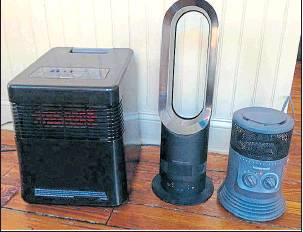Stay warm but don’t start a fire
Space heaters should be a last resort, not a first resort, for your home.
By Nick Vadala STAFF WRITER
Heating season has officially arrived, so you’ve likely already once again become accustomed to the hum of your furnace. And if your home has heating issues, you may have also broken out a space heater to stave off dropping temperatures.
But while space heaters are often used to provide an extra boost to your heat, they do come with risks. According to the National Fire Protection Association, space heaters account for about 43% of U.S. home heating fires, and 85% of deaths related to home heating fires.
“Space heaters do present a potential fire hazard, but they can be used safely,” says NFPA communications manager Susan McKelvey. “Many fires that occur are because of human error, so if you can realize where those behaviors can contribute to a home fire, you can take steps to minimize those risks.”
So how can you use space heaters without burning your house down? Here is what you need to know:
First: Do you really need one?
Space heaters are a convenient way to warm up your home, and in some cases — like if your furnace conks out — they may be necessary. But overall, they should be seen as a “last resort, not a first resort,” to solving a heating problem, says Steve Luxton, executive director and CEO of the Energy Coordinating Agency, local energy conservation nonprofit.
That’s especially true in Philadelphia, which has older housing stock with many using built before 1950. Older homes, Luxton says, often have older wiring that isn’t designed to handle the loads that a constantly running space heater demands — particularly in conjunction with other electrical appliances. Generally, he adds, space heaters pull about 1,500 watts of power per hour, which can be problematic for old wiring.
“You’re pulling a lot of energy through an old line, and it’s probably not the only appliance on that line because these homes were underserved with electrical outlets,” he says. “Electricity develops resistance, and that translates to heat,” which can cause an electrical fire.
But even if your home has newer, updated wiring, there’s another factor to consider: Cost. Electricity, Luxton says, is much more expensive to use as a heating fuel than something like gas, which can translate into higher bills during heating season if you’re constantly using a space heater. Instead, you might just consider turning your heat up a couple of degrees — or, if there’s an issue with your system, you could try having it fixed instead, such as by bleeding radiators or removing a blockage in your heating ducts.
“It will be cheaper to get a heating contractor out there to figure out why this space isn’t heating up correctly, instead of using a Band-Aid, which is what the space heater is,” he says. nvadala@inquirer.com
215-854-4517 njvadala
